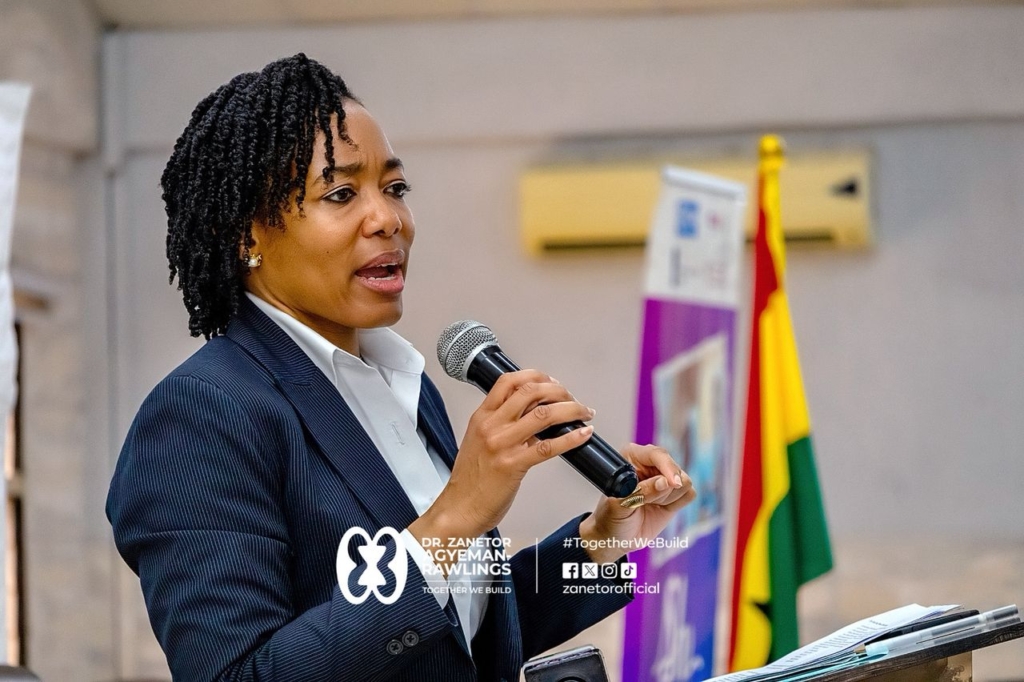
Dr. Zanetor Agyeman-Rawlings, Member of Parliament for Klottey-Korle
The Korle Klottey MP, Dr Zanetor Agyeman-Rawlings, has expressed deep concern about what she describes as a growing disconnect between citizens and governance in Ghana.
Speaking on JoyNews’ Talk No Dey Cook Rice podcast, she lamented that the country’s democracy has increasingly turned its people into outsiders.
“Know that when we talk about democracy, we don’t seem to appreciate the fact that there are responsibilities that come with the rights that we have as citizens,” she said.
“It also appears as though we’re constantly taking less responsibility as citizens for what we should be doing. Someone else is going to clean it, someone else is going to fix it, someone else is going to service it.”
Dr. Agyeman-Rawlings argued that public property is often abused because citizens fail to see it as their own.
“Even when you’re given something that you’re supposed to look after because it belongs to the government and it’s not yours, you don’t use it properly. Who is the government? We’ve steadily moved away from this sense of being a part of the thing to being outsiders of governance.”
She noted that leadership also bears responsibility for this widening gulf.
“When you don’t have leadership that is willing to bring the people along as well and expect more of people, you create a feeling of, well, what difference does it make anyway?”
Her concerns extend to youth engagement in policy design.
“A lot of young people feel like they don’t matter. They are not heard in designing policies. Nobody’s asking them, what are you actually interested in? Sometimes people are designing a thing and saying, This is what we’re giving to the youth. But maybe that’s not what they want.”
On politics, Dr Agyeman-Rawlings said the obsession with votes has undermined sound governance.
“It seems as though we’re constantly chasing elections, and the populism thing is just becoming so central to what is always being done that we are not paying enough attention to what is the right thing to do, not just for today, but for tomorrow.”
She stressed the need for tough choices and discipline.
“People look in envy at Rwanda. You can’t litter the way you do over here. There is zero tolerance for selling in the wrong space. People brag about Malaysia and Singapore, but are we prepared to do what it took to get them there? You’re not allowed to chew gum in Singapore, whether you’re a VIP or not. You cannot take plastic into Rwanda. There are certain tough decisions you have to take in order to have good governance.”
To her, good governance must go beyond elections.
“Good governance is not just about going for elections and having a certain level of trust. It’s about delivering on time, making sure the dignity of the citizen is respected, ensuring working conditions are good enough, looking at the roads and making sure that the number of people who are dying in road traffic accidents is not more than those dying of disease.”
She condemned double standards in accountability. “You can’t expect that the citizens should do the right thing and yet those who are given higher levels of responsibility and greater access to the nation’s wealth are held to a different standard.”
Citing recent examples, she said: “There’s a trader who damaged some part of the overpass, put away for two years in jail. Are we going to be able to do that to a public servant, a politician, who does the equivalent of damaging that where a road should have been built and it wasn’t done, it’s full of potholes, and they got the money? But they are walking free because maybe they supported someone’s campaign.”
She concluded with frustration over substandard public projects.
“I invite you to go and see the recent building that was handed over by the Coastal Development Agency in Adabraka Polyclinic. Have a look at it and tell me whether that is a building that should have been handed over.
“Even the painting job, I think some kid in class one would have done a better job. When we’re bringing the bar so low because of politics, I don’t understand that. We have to, at some point, draw the line and do what is right for the people of Ghana.”
DISCLAIMER: The Views, Comments, Opinions, Contributions and Statements made by Readers and Contributors on this platform do not necessarily represent the views or policy of Multimedia Group Limited.
DISCLAIMER: The Views, Comments, Opinions, Contributions and Statements made by Readers and Contributors on this platform do not necessarily represent the views or policy of Multimedia Group Limited.
Source: myjoyonline.com










